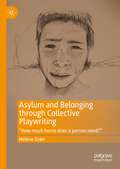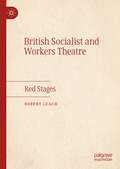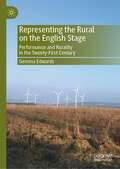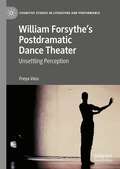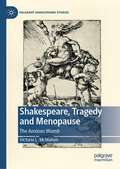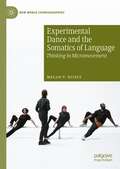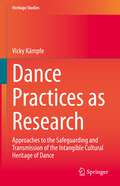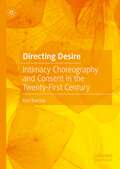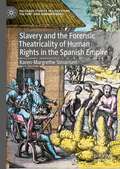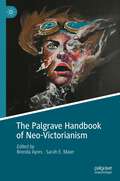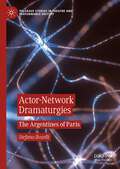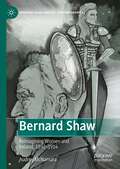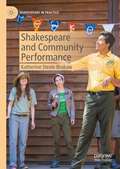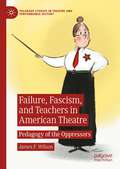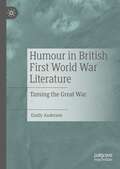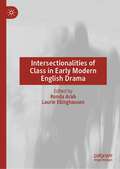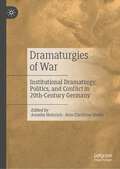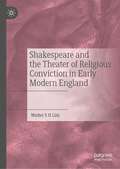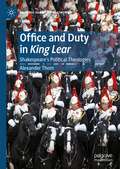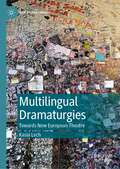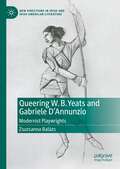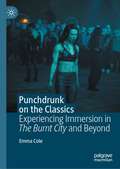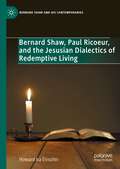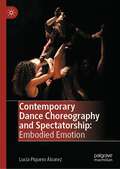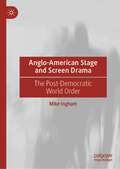- Table View
- List View
Asylum and Belonging through Collective Playwriting: "How much home does a person need?"
by Helene GrønThis book explores the notion of home in the wake of the so-called refugee crisis, and asks how home and belonging can be rethought through the act of creative practices and collective writing with refugees and asylum seekers. Where Giorgio Agamben calls the refugee ‘the figure of our time’, this study places the question of home among those who experience its ruptures. Veering away from treating the refugee as a conceptual figure, the lived experiences and creative expressions of seeking asylum in Denmark and the United Kingdom are explored instead. The study produces a theoretical framework around home by drawing from a cross-disciplinary field of existential and political philosophy, narratology, performance studies and anthropology. Moreover, it argues that theatre studies is uniquely positioned to understand the performative and storied aspects of seeking asylum and the compromises of belonging made through the asylum process.
British Socialist and Workers Theatre: Red Stages
by Robert LeachThis book provides an overview of the inception, development and achievements of British socialist and workers theatre – a feat which has not been attempted before. It explores the connections between politics and culture (specifically theatre) and between political theory and cultural (theatrical) expression. The book is organized chronologically and uncovers much in labour and theatre history which is in danger of being lost. It can also be seen as a way into different moments in its subject’s story (e.g. post-Ibsen naturalism; agitprop theatre; ‘fringe’ theatre of the 1970s) and the relationship of such forms to specific political events and ideas at specific points in history.
Representing the Rural on the English Stage: Performance and Rurality in the Twenty-First Century
by Gemma EdwardsThis book explores how the English rural has been represented in contemporary theatre and performance. Exploring a range of plays, forms, and contexts of theatre production, Representing the Rural celebrates the lively engagement with rurality on English stages since 2000, constituting the first full study of theatrical representations of rural life. Interdisciplinary in its approach, this book draws on political philosophy and cultural geography in its definitions of rurality and Englishness, and works with key theoretical concepts such as nostalgia and ethnonationalism. Covering a range of perspectives from the country garden in Mike Bartlett’s Albion to agricultural labour in Nell Leyshon’s The Farm, the enclosure acts in D.C. Moore’s Common to Black rural history in Testament’s Black Men Walking, the book shows how theatre and performance can open up different ways of reading rural geographies, histories, and lives. While Representing the Rural is aimed at students and researchers of theatre and performance, its interdisciplinary scope means that it has wider appeal to other disciplines in the arts and humanities, including geography, politics, and history.
William Forsythe’s Postdramatic Dance Theater: Unsettling Perception (Cognitive Studies in Literature and Performance)
by Freya VassThis book takes choreographer William Forsythe’s choreographic and scenographic processes as a holistic lens through which to view dance as a fundamentally visuo-sonic art form and choreography as a form of perceptual experimentation. In doing so, it reveals how the made worlds within which postdramatic dance is situated influence how choreography is perceived. Resonating with ecological perspectives but also drawing on an extensive range of cognitive research approaches, the volume’s choreo-scenographic perspective emphasizes the importance of considering the expanded scenography of lighting, sound, space, scenic elements, costume, and performer movement when analyzing the sensory and cognitive perception of dance. The volume provides a first book-length cognitive study of both an individual choreographer and the aesthetics of postdramatic theatre. It also satisfies a need for more dedicated scholarship on Forsythe, whose extensive and varied array of groundbreaking ballets and dance theater works for the Ballett Frankfurt (1984-2004), The Forsythe Company (2005-15), and as an independent choreographer have made him a key figure in 20th/21st century dance.
Shakespeare, Tragedy and Menopause: The Anxious Womb (Palgrave Shakespeare Studies)
by Victoria L. McMahonShakespeare was not only aware of the socio-cultural fears and anxieties generated by the older woman’s body but with the characterization of his tragic ageing females, Shakespeare becomes the first literary giant to explore the physiological and psychosocial condition that we have come to know as ‘menopause’. Although ‘menopause’ was not defined as a medical, physiological or sociocultural event for the early moderns, this book argues that such a medical and cultural transition can, in fact, be identified by sub-textual clues distinguished by various embodied anxieties. It explores several ageing women of the Shakespearean tragedies as they transition through this liminal menopausal period. Theoretically underscored by humoral theory, the analysis is metonymically centered upon the womb as the seat of menopausal anxiety. These menopausal undercurrents, not only permeate the dramatic action of each play, but also emanate outward to reflect the medical, physiological, cultural, social, and religious concerns generated by the ageing woman of the early modern period at large.
Experimental Dance and the Somatics of Language: Thinking in Micromovement (New World Choreographies)
by Megan V. NicelyThis book is about dance’s relationship to language. It investigates how dance bodies work with the micromovements elicited by language’s affective forces, and the micropolitics of the thought-sensations that arise when movement and words accompany one another within choreographic contexts. Situating itself where theory meets practice—the zone where ideas arise to be tested, the book draws on embodied research in practices within the lineages of American postmodern dance and Japanese butoh, set in dialog with affect-based philosophies and somatics. Understanding that language is felt, both when uttered and when unspoken, this book speaks to the choreographic thinking that takes place when language is considered a primary element in creating the sensorium.
Dance Practices as Research: Approaches to the Safeguarding and Transmission of the Intangible Cultural Heritage of Dance (Heritage Studies)
by Vicky KämpfeThis book contributes to the growing scientific literature on ‘intangible cultural heritage’ – determined by UNESCO to be particularly worthy of safeguarding and transmission – by advancing a theoretical-analytical framework for the (in)tangible cultural heritage of dance. By exploring the potential of the ‘intangible materiality’ of dance practice the book argues that implementing the concept of a ‘performative dance-archive’ creates a new analytic field: research in praxis. The concept of the ‘performative dance-archive’ draws out the potential for safeguarding and transmission of dance heritage, but also the challenges of the opposition between living heritage and the codifying of cultural inventories. This book uses the formal and contextual transformation of Argentine tango and German modern dance to discuss this ambiguity of intangible heritage and how the “performative dance-archive” creates a cognitive, empractical approach to determine, archive, and distribute dance knowledge. This is a timely methodological intervention in the context of the increasing importance of the intangible cultural heritage. It enables us to re-revise the concept of (im)materiality and the specific knowledges within cultural practice as a necessary fundamental category for research-processes and societal growth. This book is directed both to researchers in the field of intangible cultural heritage and to practitioners and researchers searching for new ways of investigating methods and perspectives to understand 'immaterial materialities'.
Directing Desire: Intimacy Choreography and Consent in the Twenty-First Century
by Kari BarclayDirecting Desire explores the rise of consent-based and trauma-informed approaches to staging sexually and sensually charged scenes for theater in the contemporary U.S., known as intimacy choreography. From 2015 to 2020, intimacy choreography transformed from a grassroots movement in experimental and regional theaters into a best practice accepted in Hollywood and on Broadway. Today, intimacy choreographers have become a veritable "intimacy industry" in the cultural sphere, sparking attention from Rolling Stone to The New York Times to the sketch comedy series Saturday Night Live. This book analyzes the forces that have led to intimacy choreography’s meteoric rise and asks what implications the field has for theater practice more broadly. Building a theoretical framework for intimacy directing, Directing Desire also strives to reorient the conversation in the field so that artists understand not only best practices in consent but also intersectional frameworks that expand and rework consent.
Slavery and the Forensic Theatricality of Human Rights in the Spanish Empire (Palgrave Studies in Literature, Culture and Human Rights)
by Karen-Margrethe SimonsenThis book is a study of the forensic theatricality of human rights claims in literary texts about slavery in the sixteenth and the nineteenth century in the Spanish Empire. The book centers on the question: how do literary texts use theatrical, multisensorial strategies to denunciate the violence against enslaved people and make a claim for their rights? The Spanish context is particularly interesting because of its early tradition of human rights thinking in the Salamanca School (especially Bartolomé de Las Casas), developed in relation to slavery and colonialism. Taking its point of departure in forensic aesthetics, the book analyzes five forms of non-narrative theatricality: allegorical, carnivalesque, tragicomic, melodramatic and tragic.
The Palgrave Handbook of Neo-Victorianism
by Brenda Ayres Sarah E. MaierThis handbook offers analysis of diverse genres and media of neo-Victorianism, including film and television adaptations of Victorian texts, authors’ life stories, graphic novels, and contemporary fiction set in the nineteenth century. Contextualized by Sarah E Maier and Brenda Ayres in a comprehensive introduction, the collection describes current trends in neo-Victorian scholarship of novels, film, theatre, crime, empire/postcolonialism, Gothic, materiality, religion and science, amongst others. A variety of scholars from around the world contribute to this volume by applying an assortment of theoretical approaches and interdisciplinary focus in their critique of a wide range of narratives—from early neo-Victorian texts such as A. S. Byatt’s Possession (1963) and Jean Rhys’ Wide Sargasso Sea (1966) to recent steampunk, from musical theatre to slumming, and from The Alienist to queerness—in their investigation of how this fiction reconstructs the past, informed by and reinforming the present.
Actor-Network Dramaturgies: The Argentines of Paris (Palgrave Studies in Theatre and Performance History)
by Stefano BoselliThis book provides key critical tools to significantly broaden the readers’ perception of theatre and performance history: in line with posthuman thought, each chapter engages Actor-Network Theory and similar theories to reveal a comprehensive range of human and non-human agents whose collaborations impact theatre productions but are often overlooked. The volume also greatly expands the information available in English on the networks created by several Argentine artists. Through a transnational, transatlantic perspective, case studies refer to the lives, theatre companies, staged productions, and visual artworks of a number of artists who left Buenos Aires during the 1960s due to a mix of personal and political reasons. By establishing themselves in the French capital, queer playwright Copi and directors Jorge Lavelli, Alfredo Arias, and Jérôme Savary, among others, became part of the larger group of intellectuals known as “the Argentines of Paris” and dominated the Parisian theatre scene between the 1980s and 90s. Focusing on these Argentine artists and their nomadic peripeteias, the study thus offers a detailed description of the complexity of agencies and assemblages inextricably involved in theatre productions, including larger historical events, everyday objects, sexual orientation, microbes, and even those agents at work well before a production is conceived.
Bernard Shaw: Reimagining Women and Ireland, 1892–1914 (Bernard Shaw and His Contemporaries)
by Audrey McNamaraShaw emerged as a playwright in the politically charged environment of 1892, for both female suffrage and Irish independence. His plays quickly advocated for societal changes with regard to women’s roles, while expanding this advocacy into considerations of Ireland. Shaw’s engagement with marriage and union as a personal contract with nationhood have never before been considered as a methodology with which to view his work. This book demonstrates that Shaw was deeply engaged with and committed to the Irish question and to social and gender issues.
Shakespeare and Community Performance (Shakespeare in Practice)
by Katherine Steele BrokawThis book explores how productions of Shakespearean plays create meaning in specific communities, with special attention to issues of access, adaptation, and activism. Instead of focusing on large professional companies, it analyzes performances put on by community theatres and grassroots companies, and in applied drama projects. It looks at Shakespearean productions created by marginalized populations in Greater London, Harlem, and Los Angeles, a Hamlet staged in the remote Faroe Islands, and eco-theatre made in California’s Yosemite National Park. The book investigates why different communities perform Shakespeare, and what challenges, opportunities, and triumphs accompany the processes of theatrical production for both the artists and the communities in which they are embedded.
Failure, Fascism, and Teachers in American Theatre: Pedagogy of the Oppressors (Palgrave Studies in Theatre and Performance History)
by James F. WilsonThis timely and accessible book explores the shifting representations of schoolteachers and professors in plays and performances primarily from the twentieth and twenty-first centuries in the United States. Examining various historical and recurring types, such as spinsters, schoolmarms, presumed sexual deviants, radicals and communists, fascists, and emasculated men teachers, Wilson shines the spotlight on both well-known and nearly-forgotten plays. The analysis draws on a range of scholars from cultural and gender studies, queer theory, and critical race discourses to consider teacher characters within notable education movements and periods of political upheaval. Richly illustrated, the book will appeal to theatre scholars and general readers as it delves into plays and performances that reflect cultural fears, desires, and fetishistic fantasies associated with educators. In the process, the scrutiny on the array of characters may help illuminate current attacks on real-life teachers while providing meaningful opportunities for intervention in the ongoing education wars.
Humour in British First World War Literature: Taming the Great War
by Emily AndersonThis book explores how humorous depictions of the Great War helped to familiarise, domesticate and tame the conflict. In contrast to the well-known First World War literature that focuses on extraordinary emotional disruption and the extremes of war, this study shows other writers used humour to create a gentle, mild amusement, drawing on familiar, popular genres and forms used before 1914. Emily Anderson argues that this humorous literature helped to transform the war into quotidian experience. Based on little-known primary material uncovered through detailed archival research, the book focuses on works that, while written by celebrated authors, tend not to be placed in the canon of Great War literature. Each chapter examines key examples of literary texts, ranging from short stories and poetry, to theatre and periodicals. In doing so, the book investigates the complex political and social significance of this tame style of humour.
Intersectionalities of Class in Early Modern English Drama
by Ronda Arab Laurie EllinghausenDefining class broadly as an identity categorization based on status, wealth, family, bloodlines, and occupation, Intersectionalities of Class in Early Modern English Drama e xplores class as a complicated, contingent phenomenon modified by a wider range of social categories apart from those defining terms, including, but not limited to, race, gender, religion, and sexuality. This collection of essays – featuring a range of international contributors – explores a broad range of questions about the intersectional factors influencing class status in early modern England, including how cultural behaviors and non-class social categories affected status and social mobility, in what ways hegemonies of elite prerogatives could be disrupted or entrenched by the myriad of intersectional factors that informed social identity, and how class position informed the embodied experience and expression of affect, gender, sexuality, and race as well as relationships to place, space, land, and the natural and civic worlds.
Dramaturgies of War: Institutional Dramaturgy, Politics, and Conflict in 20th-Century Germany
by Anselm Heinrich Ann-Christine SimkeThis book examines the institutional contexts of dramaturgical practices in the changing political landscape of 20th century Germany. Through wide-ranging case studies, it discusses the way in which operationalised modes of action, legal frameworks and an established profession have shaped dramaturgical practice and thus links to current debates around the “institutional turn” in theatre and performance studies. German theatre represents a rich and well-chosen field as it is here where the role of the dramaturg was first created and where dramaturgy played a significantly politicised role in the changing political systems of the 20th century. The volume represents an important addition to a growing field of work on dramaturgy by contributing to a historical contextualisation of current practice. In doing so, it understands dramaturgy not only as a process which occurs in rehearsal rooms and writers’ studies, but one that has far wider institutional and political implications.
Shakespeare and the Theater of Religious Conviction in Early Modern England
by Walter S LimThis book analyzes Shakespeare’s use of biblical allusions and evocation of doctrinal topics in Hamlet, Measure for Measure, The Winter’s Tale, Richard II, and The Merchant of Venice. It identifies references to theological and doctrinal commonplaces such as sin, grace, confession, damnation, and the Fall in these plays, affirming that Shakespeare’s literary imagination is very much influenced by his familiarity with the Bible and also with matters of church doctrine. This theological and doctrinal subject matter also derives its significance from genres as diverse as travel narratives, sermons, political treatises, and royal proclamations. This study looks at how Shakespeare’s deployment of religious topics interacts with ideas circulating via other cultural texts and genres in society. It also analyzes how religion enables Shakespeare’s engagement with cultural debates and political developments in England: absolutism and law; radical political theory; morality and law; and conceptions of nationhood.
Office and Duty in King Lear: Shakespeare’s Political Theologies (Palgrave Shakespeare Studies)
by Alexander ThomThis book advances five original readings of Shakespeare's King Lear, influenced by Giorgio Agamben, but tempered by primary research into Jacobean literature, law, religion, and philosophy. To grasp Lear’s encounter between politics and identity, the play demands a wider understanding of the religious influence on political thought. As Lear himself realises, sovereignty is an extreme, glamorous example of a deeper category: sacred office. Lear also shows duty intersecting with a hierarchy of bastards, outlaws, women, waifs, and monks. This book introduces concepts like petit treason, civil death, and waivery into political theological studies, complicating Agamben’s models. Goneril’s treason shows the sovereign’s consort and children are consecrated lives too. Lear’s crisis of "self-knowing" stages a landmark critique of office. The promise of his poignant speech before the prison is foreclosed by Shakespeare's invention: an officer dutifully murdering Cordelia. This book’s conclusion, through Hannah Arendt, reconsiders Lear’s persistent association with the Holocaust.
Multilingual Dramaturgies: Towards New European Theatre (New Dramaturgies)
by Kasia LechMultilingual Dramaturgies provides a study of dramaturgical practices in contemporary multilingual theatre in Europe. Featuring interviews with international theatremakers, the book gives an insight into diverse approaches towards multilingual theatre and its dramaturgy that reflect cultural, political, and economic landscapes of contemporary Europe, its inhabitants, and its theatres. First-hand accounts are contextualized to reveal a complex set of negotiations involved in the creative and political tasks of staging multilingualism and engaging the audience, as well as in practical issues like funding and developing working models. Using interviews with practitioners from a diverse range of theatrical backgrounds and career levels, and with various models of financial support, Multilingual Dramaturgies also offers an insight into different attitudes towards multilingualism in European theatres. The book illuminates not only the potential for multilingual dramaturgies, but also the practical and creative difficulties involved in making them. By bringing the voices of artists together and providing a critical commentary, the book reveals multilingual dramaturgies as webbed practices of differences that also offer new ways of understanding and performing identity in a European context. Multilingual Dramaturgies sheds light on an exciting theatre practice, argues for its central role in Europe and highlights potential directions for its further development.
Queering W. B. Yeats and Gabriele D’Annunzio: Modernist Playwrights (New Directions in Irish and Irish American Literature)
by Zsuzsanna BalázsQueering W. B. Yeats and Gabriele D’Annunzio: Modernist Playwrights challenges the general resistance in scholarship and queer studies to approach Yeats and D’Annunzio through a queer lens because of their controversial affiliations with fascism and elitism, their heterosexuality and their venerated canonical status. This book provides the first fully theorised queer and comparative reading of Yeats’s and D’Annunzio’s drama. It offers the novel contention that due to their increasing involvement in queer and feminist subcultures, their plays feature feelings that are associated with queer historiography and generate ideas that began to be theorised by queer studies more than half a century after the composition of the plays. Moreover, it uncovers an alert, subversive and often coded social commentary in eight key dramatic texts by each playwright and at the same time highlights the thus far neglected commonalities between the plays and the queer historical as well as cultural contexts of these two prominent modernists.
Punchdrunk on the Classics: Experiencing Immersion in The Burnt City and Beyond
by Emma ColePunchdrunk on the Classics: Experiencing Immersion in The Burnt City and Beyond draws attention to Punchdrunk’s use of ancient Greek literature in their creation of immersive theatre. The book documents and analyses the effects of utilising Greek tragedy within both Punchdrunk’s creative development windows, and the company’s final staged productions. It features material stretching from The House of Oedipus (2000) right through to The Burnt City (2022-23), on which the author worked as dramaturg. Chapters include rehearsal studies, explorations of how Greek literature can shape an audience’s experience in immersive theatre, and considerations of how The Burnt City might change our understanding of the poetics of immersion in antiquity. Overall, Punchdrunk on the Classics provides an unparalleled depth of insight into an individual Punchdrunk production, and highlights the until-now overlooked significance of antiquity within Punchdrunk’s practice.
Bernard Shaw, Paul Ricoeur, and the Jesusian Dialectics of Redemptive Living (Bernard Shaw and His Contemporaries)
by Howard Ira EinsohnThis book explores a heretofore unremarked linkage between Bernard Shaw, the twentieth-century French thinker Paul Ricoeur, and Jesus of Nazareth. The ties that bind them are a foundational interest in the social teachings of the Nazarene and their use of a shared dialectics with respect to living the kind of compassionate life that holds out the promise in our contemporary world of achieving something approximating universal wellness on a healthy planet at peace with itself. This work argues that the three principal subjects of the study—independently of one another—used the same dialectical method to reach the same dialectically derived conclusion about how humans can live redemptively in a fractured world.
Contemporary Dance Choreography and Spectatorship: Embodied Emotion
by Lucía Piquero ÁlvarezThis book offers an approach which unites choreographic and spectatorial perspectives, and argues for dance itself—its materials, its structures—as a medium of emotional communication. Contemporary dance often seems to contend with issues of understanding, regularly being “read” in “languages” which alienate it. Even if emotion seems a significant part of people’s engagement with dance, its workings are often surrounded by an air of mysticism. Engaging with these issues, this study investigates the experience of emotion in Euro-American contemporary dance theatre. It questions its dependence on the artist’s personal emotions, and the assumption that it is mediated by representational meaning. Instead, this book proposes that the emotional import of dance emerges from an interplay between perceptual properties and symbolic elements in an embodied affective cognitive experience. This experience includes the background of the spectator as well as the context of work, choreographer, performer(s) and other creative agents.
Anglo-American Stage and Screen Drama: The Post-Democratic World Order
by Mike InghamAnglo-American Stage and Screen Drama analyses and discusses the contemporary role of stage and screen drama as a critical forum for progressive thinking in an increasingly polarised geopolitical world. The book addresses the cultural politics of socially engaged 21st century stage plays and films, and makes the case for drama as a sociopolitical forum, in which the complex and contentious issues that confront society can be explored and debated. It conceives of Anglophone political drama as a significant intervention in today’s culture wars, representing the latter as a convenient distraction from the ongoing depredations of neoliberalism. In the main part of the book selected case-study plays and films from each of the first two decades illustrate drama’s capacity to influence critical debate on social justice issues. All of the case-study texts under discussion express a powerful aesthetics of resistance to right-wing ideology, and promote inclusive and enlightened values. This broader orientation underlines drama’s role as a channel for critical agency in today’s putative post-socialist, post-democratic climate.
